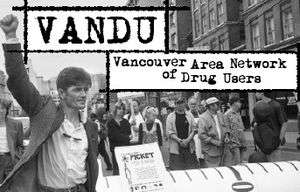Vancouver Area Network of Drug Users
The Vancouver Area Network of Drug Users or VANDU is an advocacy group based in Vancouver, British Columbia, Canada. The group believes that all drug users should have their own rights and freedoms. They have been actively involved in lobbying for support of Insite, North America's first safe injection site, located in the Downtown Eastside of Vancouver.[2]

Background
Creation
VANDU was created in January, 1998, to combat the many different threats to the social health of the population of drug users living in Vancouver, including overdose.[2] Its founding members include Ann Livingston, and Bud Osborn, who later became a member of the Vancouver-Richmond Health Board.
Notable events
One of the first events held by the members of VANDU, along with the Portland Hotel Society, was to set up 1,000 crosses in Oppenheimer Park to represent the deaths of drug users due to preventable overdoses.
This placing of crosses was used once again on Parliament Hill to lobby for InSite.
Structure and Goals
Membership
In order to become a voting member, VANDU asks that a potential member be an active or former user of illicit drugs, come to sponsored group meetings regularly, and regularly volunteer. Also, they ask that you review their core values and beliefs to ensure that you agree with them. A visit to their office is then required to get onto the members list. The membership is not limited to peoples who have used illicit drugs, but those who have never used do not have a vote.[1][3]
Goals and Beliefs
The following is an except from the VANDU website, outlining their goals and beliefs:
In keeping with our goals and beliefs, VANDU:
- is committed to increasing the capacity of people who use drugs to live healthy productive lives. We do this by affirming and strengthening people who use drugs to reduce harm to themselves and their communities. We organize in our communities to save lives by promoting local, regional and national harm reduction education, interventions and Peer Support.
- challenges traditional client/provider relationships and empowers people who use drugs to design and implement harm reduction interventions.
- believes in every person's right to health and well-being. We also believe that all people are competent to protect themselves, their loved ones and their communities from drug related harm.
- understands that drug use ranges from total abstinence to severe abuse - we recognize that some ways of using drugs are clearly safer than others.
- recognizes that the realities of poverty, racism, social isolation, past trauma, mental illness and other inequalities increase people's vulnerability to addiction and reduce their capacity for effectively reducing drug related harm.
In 2009, the acting executive director of VANDU, Ann Livingston, illustrated that the then-recent violence in Vancouver is directly related to drug policy.[5] She argues that, in accordance with the beliefs of VANDU, prohibition should be altered or dropped and a legal drug market be created to eliminate most of the harms associated with drug use.
Staff and Teams
VANDU has created an injection support team to "provide education and support" for users who use intravenously and need education on how to safely inject.[6] This team actually gives direct information to injectors on how to physically inject themselves, as opposed to general harm reduction information, which simply recommends using clean equipment but does not touch the subject of actual injection assistance.
See also
- Harm Reduction
- Prohibition
- Demand reduction
- Safe injection
- Students for Sensible Drug Policy (SSDP)
- Law Enforcement Against Prohibition
References
- VANDU Pamphlet Page 1
- Vancouver Area Network of Drug Users (2009). "VANDU". Retrieved 2009-04-02.
- VANDU Pamphlet Page 2
- "VANDU Website".
- "24hrs web article".
- "Stop The Drug War Article". stopthedrugwar.org.
External links
- VANDU - Official website